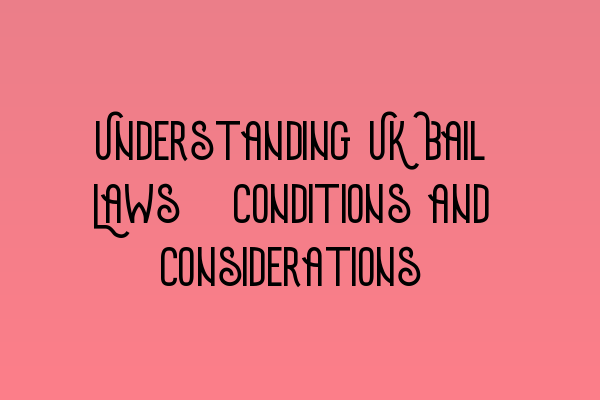Understanding UK Bail Laws: Conditions and Considerations
Welcome to the SQE Criminal Law & Practice Law UK blog! Here, we provide valuable insights into various aspects of criminal law in the UK. In today’s post, we will delve into the intricacies of UK bail laws, exploring the conditions and considerations one must be aware of under these regulations.
Bail is an important pillar of the criminal justice system, allowing individuals who have been arrested to secure their release from custody while awaiting trial. However, it is important to note that bail is not granted automatically. The court considers various factors before making a decision, taking into account the risk of flight, potential harm to the public, and the probability of the defendant interfering with the investigation or witnesses.
When it comes to granting bail, there are certain conditions that may be imposed on the defendant. These conditions are designed to ensure their compliance with legal obligations and society’s safety. Some common conditions include:
- Residence Requirement: The court may require the defendant to provide a verifiable address where they will reside while on bail. This helps to ensure that they can be easily located if necessary.
- Reporting Obligations: Defendants may be required to regularly report to their local police station or another specified authority. This helps authorities keep track of their movements and activities.
- Curfews: A curfew is often imposed, prohibiting the defendant from leaving their residence during specified hours. This is to prevent them from engaging in any potential criminal activity.
- Surrendering Travel Documents: The court may require the defendant to surrender their passport or other travel documents to prevent them from fleeing the country.
- Non-Contact Orders: In cases where the defendant poses a risk of harm to specific individuals, the court may impose non-contact orders, prohibiting any form of communication or interaction with those individuals.
It is important for defendants to comply with these conditions to avoid potential consequences such as revocation of bail or additional criminal charges. However, it is equally crucial for individuals to understand their rights and consult with a qualified solicitor to ensure their best interests are protected.
If you require legal assistance, our team of experienced solicitors at SQE Criminal Law & Practice Law UK is here to help. We specialize in criminal law cases and can provide the guidance and representation you need.
As the SQE 1 and SQE 2 exams are crucial steps towards becoming a qualified solicitor, it is vital to be well-prepared. Take advantage of our SQE 1 Practice Exam Questions and SQE 1 Practice Mocks FLK1 FLK2 resources to enhance your exam readiness.
For those seeking SQE 2 preparation courses, we offer comprehensive programs tailored to help you excel in your exam. Learn more about our SQE 2 Preparation Courses.
Stay up-to-date with the latest SQE exam dates by referring to our informative article on SRA SQE Exam Dates.
Thank you for reading our blog post on understanding UK bail laws. We hope you found it informative and valuable. Remember, knowledge is power, and our team at SQE Criminal Law & Practice Law UK is dedicated to empowering individuals with the legal knowledge they need.
